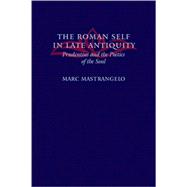
Note: Supplemental materials are not guaranteed with Rental or Used book purchases.
Purchase Benefits
Looking to rent a book? Rent The Roman Self in Late Antiquity [ISBN: 9780801887222] for the semester, quarter, and short term or search our site for other textbooks by Mastrangelo, Marc. Renting a textbook can save you up to 90% from the cost of buying.
Marc Mastrangelo is an associate professor of classical studies at Dickinson College.
| List of illustrations | |
| An Epic Successor? Prudentius, Aeneid 6, and Roman Epic Tradition | p. 14 |
| Christian History and the Narrative of Rome | p. 41 |
| Christian Theology and the Making of Allegory | p. 82 |
| Pagan Philosophy and the Making of Allegory | p. 121 |
| Epilogue: Self, Poetry, and Literary History in Prudentius | p. 160 |
| Notes | p. 177 |
| Works Cited | p. 239 |
| Index | p. 251 |
| Table of Contents provided by Blackwell. All Rights Reserved. |
The New copy of this book will include any supplemental materials advertised. Please check the title of the book to determine if it should include any access cards, study guides, lab manuals, CDs, etc.
The Used, Rental and eBook copies of this book are not guaranteed to include any supplemental materials. Typically, only the book itself is included. This is true even if the title states it includes any access cards, study guides, lab manuals, CDs, etc.